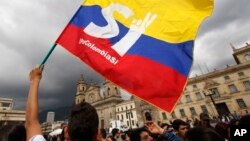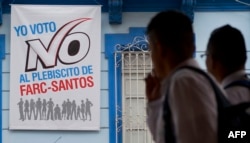Colombia’s government and Marxist guerrillas went back to the drawing board in Havana Tuesday after a peace deal they painstakingly negotiated over four years was rejected in a referendum result.
In a vote, which confounded opinion polls and was a disaster for President Juan Manuel Santos, Colombians narrowly rebuffed the pact Sunday as too lenient on the rebels.
The government said the president’s lead negotiators, Humberto de la Calle and Sergio Jaramillo, were back at a Havana convention center Tuesday meeting their Revolutionary Armed Forces of Colombia (FARC) counterparts to see if a new deal, stringent enough to satisfy critics, can be hashed out.
The two sides have met at the Cuban capital since 2012 and reached an accord to end Colombia's 52-year war that has killed about 250,000 people.
Rescuing the peace deal may be a long and complex process. Colombian Foreign Minister Maria Angela Holguin said the decision whether to officially renegotiate the accord lies with the FARC.
“The thing is, just as the government has its deal breakers, so does the FARC, so we have to see if it is willing to reopen the accord,” Holguin told reporters.
All sides, including “No” voters, who carried the day Sunday by less than half a percentage point, say they want an end to war, and the two parties have kept their cease-fire.
But there is vehement opposition, led by former President Alvaro Uribe, to major planks of the previous deal, including guaranteed congressional seats for the FARC and immunity from traditional jail sentences for leaders.
A renegotiation seems to depend on whether the FARC would accept tougher conditions, maybe combined with a softening of demands from Uribe. After years of refusing to meet negotiators, Uribe said he is willing to seek a joint solution.
Three representatives from his right-wing Democratic Center party will to pore over details with three from the government. In what is turning into a dual negotiation process, those meetings are to commence once de la Calle returns from Cuba.
Colombian financial markets fell Monday as investors worried the peace deal limbo would delay fiscal reforms like tax changes.
Finance Minister Mauricio Cardenas, however, said the tax reforms would go ahead.






